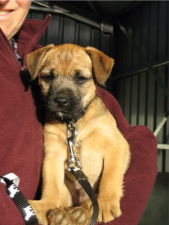Updated November 29, 2020

A lot of people make this mistake and it’s easy to see why. Puppy preschool is all about socialising dogs and if there’s a dog at home, surely this is enough. However, if anything, having a dog at home makes pups less social. I’ll explain why this is so.
A pup who lives with another dog will strongly bond to that dog and the dogs will get on well. However, the effect of successful puppy classes is to make pups generalise this positive attitude to all dogs. The managed group environment at this critical sensitive period of social development is the key. Our intention is to socialise puppies so that their first reaction to seeing any dog at any stage in their life will be a positive one.
The dog who only grew up with another dog will usually not achieve this. We observe them to often show a fearful or anxious response when confronted by an unknown dog. It sometimes seems almost as if the presence of the first dog makes the second dog less likely to interact even in the exploratory puppy stage. It may be a bit like going to a party alone versus going with a best friend- alone most of us will end up meeting more people.
Sometimes this can worsen into outright dependence on the first dog. We see many second dogs who are not able to separate at all from their mate without signs of distress.
As a bonus, dogs who went to well-managed puppy training at the vet will keep coming back wagging their tails. In our classes, we keep a maximum of five puppies managed by Delta-accredited instructors. Puppies get to like us before they need us in a time of illness or pain and first impressions really matter.
For all these reasons, we try very hard to get every pup to attend our classes. Remember, they are not about puppy training- there’s plenty of time for that once the pup has learnt to enjoy the company of other dogs. However, puppy preschool should be a matter of urgency as the period for social learning is very short, and is finished by around 16 weeks of age.
The best way to understand what puppy socialisation is trying to do is to look at the wolf. Despite some very significant changes, inside our growing puppies is still mostly a wolf brain. Wolves live in packs, and bond very early to the whole pack. Puppy preschool is akin to giving the pups a pack experience. But the big difference is that wolves must also be prepared to fight and possibly kill wolves from other packs. If we want our dogs to get the most out of life we need our dogs to love every dog, all the time- at the park, the cafe, in the street, anywhere we take them.
For more information visit our pages at Puppy Preschool Aims and Puppy Pre-school Program.
And yes, that picture is my boy Tinker 9 years ago.
Have something to add? Comments (if open) will appear within 24 hours.
By Andrew Spanner BVSc(Hons) MVetStud, a vet in Adelaide, Australia. Meet his team here.

He’s just so precious. All baby and innocent. Enjoy the puppy-ness while you can. They grow up way too fast. I lost my newfoundland/retreiver Molly, last week at the age of 12. It’s nice to see the puppy posts. It makes me think of her when she was young.